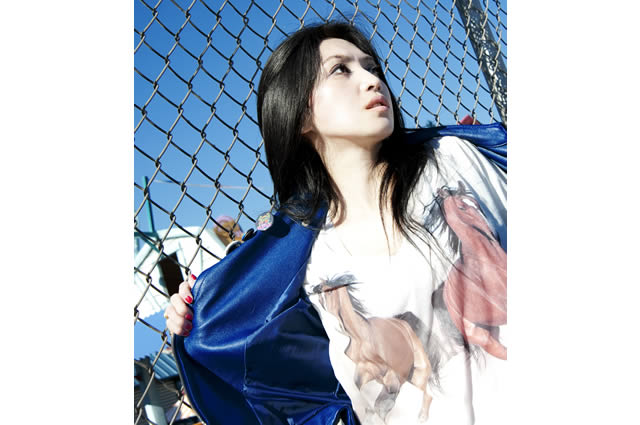
Chihiro Onitsuka
 As a child, Chihiro was very much encouraged by her parents to listen to and enjoy music, seeing as her mother was especially fond of US folk pop bands like The Carpenters. In school Chihiro liked poetry, which she wrote prodigiously before she was inspired to write music. Her inspiration to write songs, as well as perform them, grew from her admiration of US musician Jewel.
As a child, Chihiro was very much encouraged by her parents to listen to and enjoy music, seeing as her mother was especially fond of US folk pop bands like The Carpenters. In school Chihiro liked poetry, which she wrote prodigiously before she was inspired to write music. Her inspiration to write songs, as well as perform them, grew from her admiration of US musician Jewel.
During her senior high school years, Chihiro continued to write and received a great boost to both her confidence and musical legitimacy by winning the Grand Prize of the prestigious Virgin Tokyo Artists Audition. Soon after, in 1999, the then seventeen year old moved to Tokyo to begin her musical career.
Spring of 2000 saw the release of her first single, Shine, which was soon followed by what could be her most famous song, Gekkou, used as the opening theme to a popular TV show “Trick.” Two more successful singles, which showcased Chihiro’s wide range of styles and even wider range of singing voice, followed. Both the music industry and the public were amazed at her combination of young age and advanced musical talent, which were a total contrast to the usual carbon copy female J-pop idols that dominated the charts. Chihiro was a complete artist who relied on her vocal skills, piano and heartfelt performances to entertain the crowds, which she did during the summer of 2001 in support of the release of her debut album, Insomnia. The album topped the Oricon charts in its first week of release and two songs, Innocence and Cage, received international attention from the US. Innocence was used in a television commercial whilst Cage received a full single release. Meanwhile, in Japan, Chihiro released her first DVD, Cradle on my Noise and was honored with a Japan Record Award for the lyrics to her song Memai.
The beginning of 2002 was rather quiet until the release of her second full album, This Armour, which was soon followed by Chihiro being presented with a Golden Disc Award for her first album. The summer was filled with a long tour entitled Live Vibe, which was received with great enthusiasm by her ever growing fan base. However, it seemed as though, even with a busy tour schedule, there was time to write as her third album, Sugar High, was released at the end of the year.
The following year brought a quartet of singles, which were released from August through November, and an album follow-up containing the single versions and new songs was highly anticipated. However, instead of this album, the record label issued a box set of singles, which seemed to be designed as a marketing ploy to get fans to buy all her singles again without the expected extra material that an album would contain. This decision by the record label was a fatal mistake as Chihiro was so opposed to the idea that she broke ties with the company and moved to the Universal label. Universal continues to release her old material as they still own the rights.
Chihiro’s style changed drastically during this time and her first release on her new record label was a surprise for her fans. She debuted her new style by performing the song Sodatsu Zassou during a live concert. It is interesting that to mirror her new heavier rock style she also performed a cover of a song by the US Grunge Rock band Nirvana. The single, Sodatsu Zassou, was released the following month, in October, and was accompanied by a shocking announcement from Chihiro. She would be taking a break from music for an undisclosed period of time for medical reasons.
However, her hiatus was not long lived because on March 17, 2007, Chihiro marked her return to the music world with a special event that was held at Studio Coast in Tokyo. Her return also signaled changes with her record label. Since mid-2007 Chihiro has been signed to Toshiba records where she had become increasingly successful. Her latest single, Hotaru, which was the theme song for the TV show “Last Game: Saigo no Soukeisen,” and a live DVD entitled NINE DIRTS AND SNOW WHITE FLICKERS was released simultaneously on August 8, 2008.
Offical Website: http://www.onitsuka-chihiro.jp/
Chihiro Onitsuka